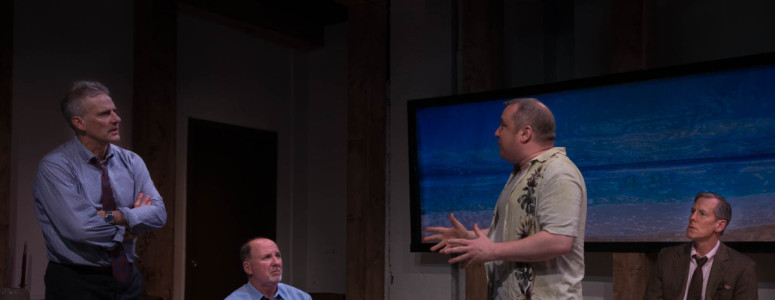Yes, when you come to New York, you must see a Broadway show. The most adventurous of you will venture off-Broadway.
But few of you will even consider off-off-Broadway.
So for better or worse (which, when you think of it, is what Broadway and off-Broadway offer, too), how about taking a chance and going off-off-Broadway? Any theatergoer worth his salt, oxygen, carbon, hydrogen, nitrogen, calcium, and phosphorus should have this off-the-beaten-New-York-track experience at least once in his life.
There are assets: 1) lower prices; 2) closer proximity to the action.
There are possible liabilities: 1) a less than glamorous theater space; 2) chairs with no arms; 3) a long elevator ride in an industrial building.
All five of those pertain to Mallorca, Sheldon Bull’s new comedy at the Abingdon Theatre Company at 312 West 36th Street. (There’s a bonus: many off-off Broadway theaters sports such hard-to-find obscure addresses as President Street or Greenpoint Avenue. But 36th Street is, if not a stone’s throw from where Aladdin and On the Twentieth Century are playing, not much more than a just a champion javelin thrower’s toss.
Longtime Broadway observers will recognize Mallorca as the type of play that would have been produced on Broadway during the mid-20th-century. For much of its 100-minute length, Bull’s work resembles one of those comedies that would open on Thursday, call it a life on Saturday and get itself into an amateur catalogue where it would remain mostly unnoticed.
Hold on, however. The breezy and seemingly inconsequential show does have some serious matters on its mind. The last ten minutes redeem what’s come before and allows for some thought-provoking entertainment.
At rise, Stan is on the phone with his very busy wife when the doorbell rings. It’s Leo, who’s not exactly his friend, but a friend of their mutual pal Julius. The three will be taking in a Knicks’ game along with Arthur, another acquaintance-through-Julius who doesn’t quite qualify as a friend. As Stan says to him, “I don’t recall you ever asking a single question about me.”
Where’s Julius who has the tickets? After Arthur arrives, Stan and Leo lament that the game has already started and they’re missing it. This would suggest that the playwright isn’t much of an NBA fan, for most basketball aficionados aren’t interested in the beginning of a game, which is often rather perfunctory, but only in the fourth quarter when the teams really heat up. (Arthur is exempt from this criticism, for he’s hardly a Knicks’ fan; in fact, he asks if they’re going to be watching basketball or hockey.)
Julius arrives despondent. He’s still not over his six-months-ago breakup with a girlfriend so he’s spending his savings as fast as he can. In fact, he paid $600 per ticket for the game, and when he matter-of-factly indicates that he expects to be reimbursed, none of the friends complains that he made the decision to buy scalper’s tickets without informing him. And these guys aren’t supposed to be good friends?
Stan tells the despondent Leo that “Everybody is unhappy.” Asks Leo of all of them “Haven’t you ever thought of chucking the whole thing?” In fact, Julius has – not as a suicide, but as someone who’s bought a first-class ticket to Mallorca where he can get away from it all. And he does, which is where the second act starts.
Many of Bull’s lines make one go “Huh???” Arthur is an investment banker, but he pooh-poohs Brooklyn. Doesn’t he know its real-estate is very hot at the moment? Leo complains that if Julius doesn’t attend the game, he’ll have a stranger sitting next to him. Well, some one of the four acquaintances will undoubtedly meet that fate.
Donald Brenner stages it in the time-honored fast ‘n’ funny way that the best of these comedies boasted. But like most directors, he forgets that when a character goes to the bathroom and closes the door, if the people still in the living room talk about him they must lower their voices. This is a New York City apartment, after all. Bathroom doors are quite thin and even the hard of hearing would be able to pick up the conversation in the next room. Now’s the time for sotto voce.
And we know the door’s not thick, for the first sound we hear in Act One Scene One is a man in the bathroom urinating and flushing. A later scene will begin the same way. Men relieving themselves, it seems, fascinate the playwright. There will be some middle-aged prostate talk, which is honest and true, but a later scene has two friends inadvertently peeing on a friend who’s out of sight. When he comes in, everyone understandably objects to his smell. And yet he makes no effort to change his clothes and when he gets close to the other characters, they all-too-conveniently forget that he stinks. Later, one character even hugs him. Perhaps this is the show that should have been called Urinetown.
All this bathroom talk might make you want to relieve yourself. If so, don’t go towards the end. That’s where Bull makes a sincere turn, atones for his anything-for-a-laugh philosophy and makes a poignant point. He writes so well here and focuses in on a terrific theme that his secrets deserve to be kept and won’t be divulged here.
So why tell all the rest? So you can steel yourself for the flaws before you get there. And if you decide not to take a chance on Mallorca –which I’ll fully understand — you STILL should give some off-off-Broadway show a chance.




